Carmel Winters is an award-winning writer and director for the screen and stage. Her debut feature “Snap” won Best Irish Feature and Best Director at the Dublin Critics’ Circle Awards and the audience vote for Best Film at the Montevideo International Film Festival. Winters has since premiered four new plays. She is currently working on her third feature film, an original TV drama series, and a stage musical.
“Float Like a Butterfly” will begin screening at the 2018 Toronto International Film Festival on September 8.
W&H: Describe the film for us in your own words.
CW: “We can’t keep loving what hurts us.” Though this line was cut from the script, the sentiment still holds true. The film is about finding the strength and courage to carve our own destiny. Our sense of belonging is precious, so how can we balance that need with our need to be free?
Patriarchy is not an abstract concept. How can we fight “the machine” when the machine is manned by those we love?
W&H: What drew you to this story?
CW: I love Muhammad Ali’s mantra: “I am the greatest, I said it before I knew I was.” It seems particularly relevant to women right now. I hope after the acknowledgment of injury and injustice, the next stage of the #MeToo movement will be welcoming and embracing the greatness of women as supreme creators.
W&H: What do you want people to think about when they are leaving the theater?
CW: I want people to leave feeling emotionally affirmed, energized, and inspired. I want women to feel honored, and for men to understand that honoring women is good for men too.
W&H: What was the biggest challenge in making the film?
CW: Having a female main character is difficult for some people even to recognize. It’s harder still when that character is both a teenager and heroic. A girl coming into womanhood is intensely potent. Our culture has trivialized female adolescence. We have sold girls the idea that their appearance is what matters most. I remember having an acute sense of justice as a teenage girl, as well as a keen capacity for leadership.
Hazel Doupe, the actress who plays Frances, has the same extraordinary courage, determination, and wisdom as the character she plays. It is revelatory to watch.
W&H: How did you get your film funded? Share some insights into how you got the film made.
CW: It was a mixture of funding from the Irish Film Board, the Broadcasting Authority of Ireland, and tax credits available from the Irish government. We were partially financed for a few years, which can be the toughest place in which to be. You need to be very tenacious and keep carrying the torch for others to see by!
W&H: What inspired you to become a filmmaker?
CW: I wanted to act, teach, heal, amuse, write, mother, lead, and investigate. When I realized that I could do all of these things as a film director I was in my element!
W&H: What’s the best and worst advice you’ve received?
CW: The best: “No film ever gets made because of what’s on the page. This is an industry built on relationships.” This was said by a brilliant and wise writer. I credit this single statement with me getting my first feature made. I rolled up my sleeves and took the reins.
The worst: “A writer can live anywhere.” This was from a well-meaning producer who told me that I could take myself off to a deserted island and hit “send” on the scripts, and they would get themselves made.
W&H: What advice do you have for other female directors?
CW: Make friends with female directors you truly admire and trust. Their vision, friendship, and support will sustain you through the tough times.
W&H: Name your favorite woman-directed film and why.
CW: There are truly so many that I can’t pick only one favorite, but the most recent is “I Am Not A Witch,” written and directed by Rungano Nyoni. There is a singularity of vision and intent about this film which inspires me to keep seeing through and true.
W&H: Hollywood and the global film industry are in the midst of undergoing a major transformation. What differences have you noticed since the #MeToo and #TimesUp movements launched?
CW: Women are turning to each other more. Men are largely bewildered, wondering “what privilege?” The difference I look forward to most is male filmmakers answering questions about what it means to be a male filmmaker, and taking part in panels called “Men in Film.” We are still ghettoizing female filmmakers by putting the tag “female” in front of the world “filmmaker” if we don’t do the same thing to men.







